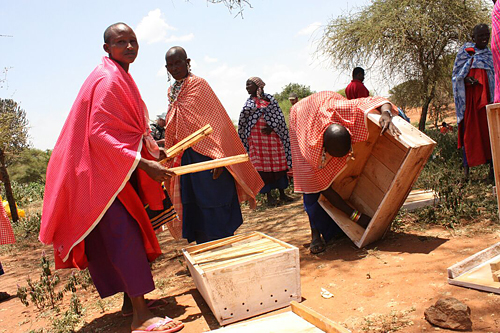
Mission
African People & Wildlife Fund (APW) builds the capacity of rural Africans to engage in environmental conservation and sustainable livelihood strategies that promote the dual objectives of biodiversity conservation and poverty alleviation. The organization emphasizes the importance of place-based and community-led initiatives that support the collective management of natural resources for the mutual benefit of people and wildlife.
Life Challenges of the Women Served
APW works across Northern Tanzania in 19 Maasai communities, an unfenced landscape which is home to Tanzania’s most threatened population of African lion. Women represent 80 percent of the population and are the principal managers of natural resources. The gross annual income is approximately $900 USD per household.
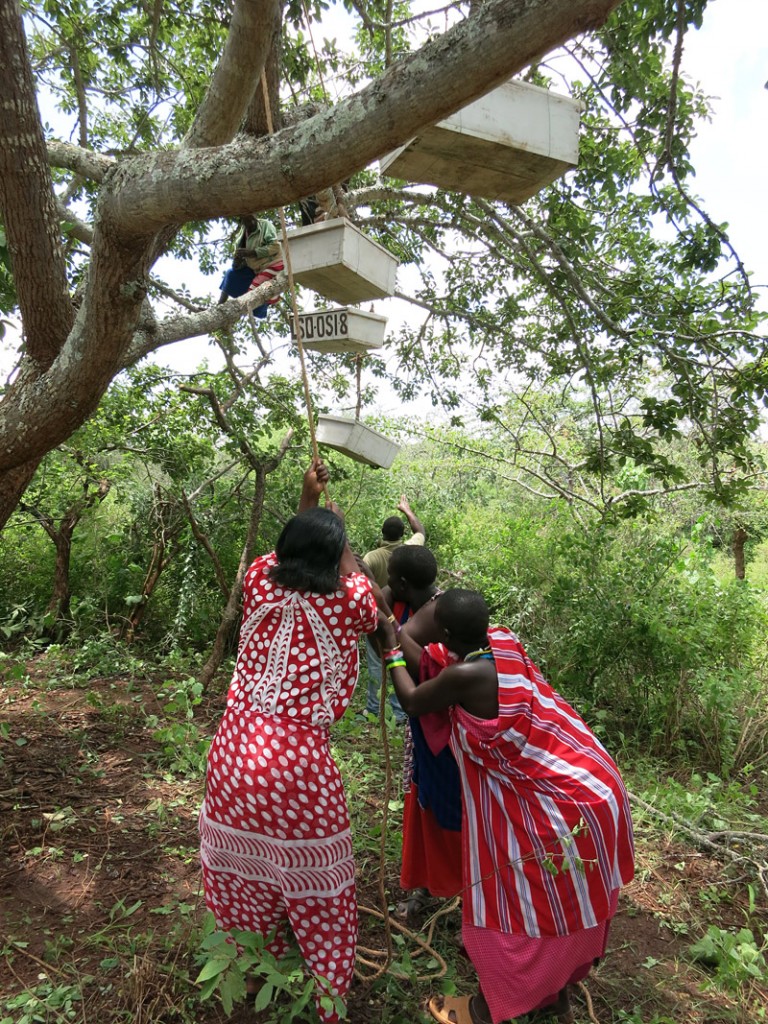 The Maasai culture is based on a traditional patriarchy where women have no rights to the land, water or the livestock of their families. Wives are sometimes said to be less important to a man than his cattle, and sometimes daughters are not counted in response to the question “How many children do you have?” As a result, Maasai women are among the poorest and most marginalized groups in Tanzanian society, with girls’ access to education often restricted by their responsibility to perform household chores. However, if a woman generates her own income, she is allowed to keep and use it however she wishes. Many Maasai live far from urban areas, and due to their home-based responsibilities, cannot access distant resources that might allow women and girls to develop the capabilities they need to generate such an income. Meanwhile, because women are not recognized as participants in the local economy or as a societal group that impacts local land uses, they are also often excluded from community decisions about resource use.
The Maasai culture is based on a traditional patriarchy where women have no rights to the land, water or the livestock of their families. Wives are sometimes said to be less important to a man than his cattle, and sometimes daughters are not counted in response to the question “How many children do you have?” As a result, Maasai women are among the poorest and most marginalized groups in Tanzanian society, with girls’ access to education often restricted by their responsibility to perform household chores. However, if a woman generates her own income, she is allowed to keep and use it however she wishes. Many Maasai live far from urban areas, and due to their home-based responsibilities, cannot access distant resources that might allow women and girls to develop the capabilities they need to generate such an income. Meanwhile, because women are not recognized as participants in the local economy or as a societal group that impacts local land uses, they are also often excluded from community decisions about resource use.
For Maasai families, wealth is held in the form of vast herds of livestock and in particular a special breed of drought-tolerant cattle. These cattle thrive on healthy rangelands and pass this productivity on to the Maasai women who “harvest” blood and milk from the household’s livestock to feed their families. The long-term wellbeing of the Maasai is tied directly to the sustained health of the habitat and rangelands around them. However, under prolonged drought conditions and the negative impacts of a blanket government policy that encourages the conversion of grazing land into land for farming, the Maasai are beginning to lose access to critical pastures. As their cattle begin to starve and vital water sources disappear due to overuse, women are increasingly pressed to find sufficient food and water for their families. APW seeks to develop new economic opportunities, such as beekeeping, that can provide vital household income while also respecting the fragile nature of this dryland environment. Via a study tour for community leaders to visit both cultivated and uncultivated land in Kenya, APW was able to demonstrate the dangers of unsustainable land use to the community and to showcase novel approaches that combine livestock production with additional environmentally-friendly activities such as tourism and microenterprises via direct, community-to-community conversations.
The Project
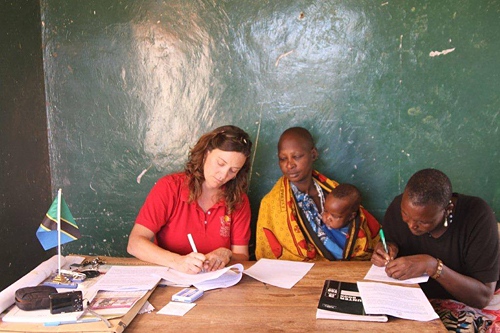 The main goal of the Women’s Entrepreneurship and Empowerment Initiative is to empower Maasai women to protect their natural resources for themselves and for future generations, through entrepreneurship and environmentally-friendly small business development.
The main goal of the Women’s Entrepreneurship and Empowerment Initiative is to empower Maasai women to protect their natural resources for themselves and for future generations, through entrepreneurship and environmentally-friendly small business development.
Women Owned Income: Through scheduled lectures and seminars on how to successfully start a business, Maasai women’s groups who receive a micro-grant will successfully generate environmentally-friendly income, projected to be a minimum of TSH 450,000 per year. This income is almost always spent on the family rather than the individual women, in particular to pay for supplemental food (such as maize and beans) and school fees. This in turn raises the overall health of the community and the ability of future generations to break poverty cycles through education. Rather than request financial repayment of grants, APW requires all women business owners to organize and participate in impactful conservation projects within their communities, such as village clean-up days and stream bank restoration projects.
Environmental knowledge: Through scheduled lectures and seminars on how to successfully start a business, Maasai women will gain knowledge of the environment and understand the global and local ecological forces that impact their day-to-day livelihoods, in particular regarding water and food security. Beekeeping, for example, is critical to increasing food production through pollination. Armed with this information, women can raise their voices on behalf of the environment (and their businesses) as natural resource and entrepreneurship experts in community decision-making forums.
Social Empowerment: Female representatives from Maasai women’s groups will be included in government and community meetings during which major decisions about land use and natural resource planning are being made. APW anticipates community-wide shifts toward more sustainable land use options as well as a greater respect from men towards women, inviting them to join conversations around land use.
Environmental Benefits: Maasai women will conduct 40 conservation projects as “repayment” for their micro-grants, involving 1,000 additional community members in local community conservation projects and raising awareness of environmental issues within the overall community and among their families. They will also contribute to land protection via the demarcation of a pilot bee reserve on the Maasai Steppe, supported by the Beekeeping Act which provides legislature to protect land around beehives.
Sustainable Development Goals
![]()
![]()
![]()
![]()
![]()
![]()
![]()
Questions for Discussion
- How do you think empowering women with their own income can impact their children?
- What might the long term impact be of including women in making decisions about the use of natural resources?
- How might beekeeping serve to have an impact on women, their families and the community?
How the Grant Will be Used
DFW’s donation of $47,500 includes
- Women’s Entrepreneurship Seminars: Over three days, lectures are coupled with small group work to teach the core concepts of how to build and run a business. Participants then develop group project plans that specifically target environmentally-friendly business opportunities. The cost includes transportation and food.
- Women’s Environmentally-Friendly Micro-fund: Seminar participants apply for grants from APW’s women’s business micro-fund with the intent to improve household income, to put business skills into practice and to improve environmental measures. Following a pre-application phase, interview and then review of full application materials, APW announces grant awardees. For beekeeping awards, a set number of hives are required to be purchased by each awardee. Monitoring of 25 past awards has demonstrated 100 percent compliance.
- Women’s Business Development: Grant awardees work with APW to secure training, materials, market access and other necessities for making their business a success. Rather than request financial repayment of grants, APW requires all women business owners to organize and participate in impactful conservation projects within their communities, such as village clean-up days and stream bank restoration projects.
- Program Officers for community development and the education program, as well as beekeeping program and extension officers and a community trainer.
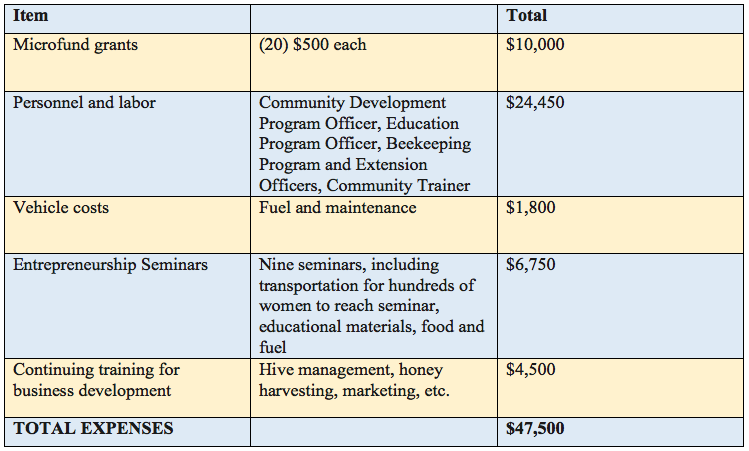
Why We Love This Project/Organization
We love this project’s focus on poverty reduction, women’s empowerment and environmental sustainability. By working with Maasai women who are the principal managers of natural resources in this region, APW is helping to protect communal lands, reduce human-wildlife conflict, support active rangeland management, foster conservation and economic empowerment of these women.
Evidence of Success
In past successes, APW has installed more than 530 Living Walls, impacting 10,000 people nightly, protecting 100,000 head of livestock and saving 100 lions annually. Living Walls replace traditional acacia thorn-brush corrals which must be constantly replenished – an arduous job that is typically performed by women.
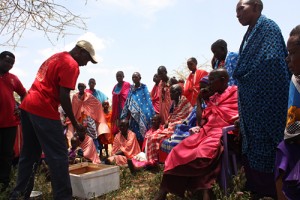 Since 2012, APW has engaged 825 adults in natural resource management seminars. Pre- and post-seminar surveys show marked increases in conservation knowledge. APW has also taught more than 5,000 schoolchildren about environmental issues. These children implement village clean-ups, watershed restoration projects and organize environmental celebrations. Currently, APW supports 25 full-ride scholarships to secondary school for rural youth including a division two scholar (a high achievement for a rural student competing with urban-educated children).
Since 2012, APW has engaged 825 adults in natural resource management seminars. Pre- and post-seminar surveys show marked increases in conservation knowledge. APW has also taught more than 5,000 schoolchildren about environmental issues. These children implement village clean-ups, watershed restoration projects and organize environmental celebrations. Currently, APW supports 25 full-ride scholarships to secondary school for rural youth including a division two scholar (a high achievement for a rural student competing with urban-educated children).
Communities have begun four on-the-ground projects that promote natural resource conservation. Two communities have installed rainwater-harvesting systems, one at a rural secondary school and one at a community vocational school. The other projects are restoring pasture/wildlife habitat and developing a community-owned campsite for tourist groups.
APW has awarded 27 small grants to women entrepreneurs since 2013 for environmentally-friendly businesses and has involved over 500 women in three communities via local women’s associations. APW-funded women have installed 250 beehives to produce marketable honey. As a result of the women’s business empowerment efforts and the development of women’s associations, individual women are taking on greater leadership roles in their communities.
Voices of the Girls
After participating in an APW natural resource seminar:
Community member Jumanne Hamisi applied to become a community trainer after participating in a watershed seminar and said, “I’ve learned so much. I never realized that so many things that we do are harmful to our environment. Sharing what I have learned with others is making a real difference in our community. Now, we have some hope for the future.”
Helena Mbarnoti was director of the first Loibor Siret Women’s Association and is a founding member of Reto-o-Reto, the community’s first natural resources planning commission. From these platforms, and as a member of the local village government, she raises her strong voice to represent and advocate for women in her community, particularly on the topics of resource use rights. She states, “We now have a clear vision of what we would like for our future and we will be working towards it.” She has also taken on a role as one of APW’s community trainers for improved rangeland management and, in this venue, educates women’s groups across Northern Tanzania about how to increase income and ensure healthy environments through enterprises such as her honey business. “A good business does not destroy the environment. That is why we chose beekeeping. And now, many women are benefiting from this program. Now we are seen as having a purpose.”
About the Organization
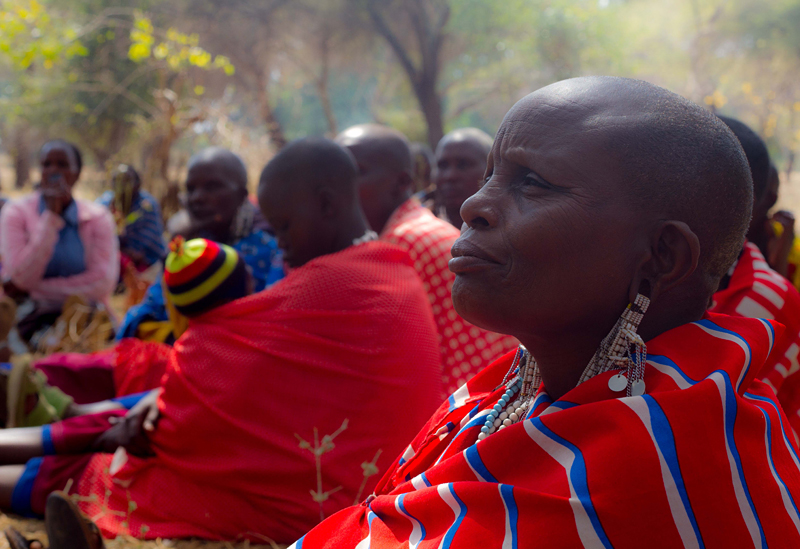 APW was co-founded in 2005 by Dr. Laly Lichtenfeld and Charles Trout as an independent, US non-profit to transform the practice of community-based conservation on the continent. By empowering rural Africans to manage and derive significant benefits from their own natural resources, APW has successfully created conservation programs and solutions that mutually benefit people and wildlife in Tanzania. Reflecting its grassroots approach, APW made history in Tanzania in 2006 by becoming the first non-profit to receive a donation of land from Maasai communities. The organization built the Noloholo Environmental Center on 10 acres of land to serve as Northern Tanzania’s first rural environmental center. In 2008, Lichtenfeld and Trout officially registered the Tanzania People & Wildlife Fund (TPW) as a local Tanzanian NGO and APW’s first sister organization on the African continent. In 2014, APW published a seminal paper proving the effectiveness of its community conservation initiative called Living Walls. The organization was a United Nations Equator Prize 2014 Finalist, a Clinton Global Initiative invited complimentary member, a World Association of Zoos and Aquariums conservation partner and a 2014 Edison Awards nominee.
APW was co-founded in 2005 by Dr. Laly Lichtenfeld and Charles Trout as an independent, US non-profit to transform the practice of community-based conservation on the continent. By empowering rural Africans to manage and derive significant benefits from their own natural resources, APW has successfully created conservation programs and solutions that mutually benefit people and wildlife in Tanzania. Reflecting its grassroots approach, APW made history in Tanzania in 2006 by becoming the first non-profit to receive a donation of land from Maasai communities. The organization built the Noloholo Environmental Center on 10 acres of land to serve as Northern Tanzania’s first rural environmental center. In 2008, Lichtenfeld and Trout officially registered the Tanzania People & Wildlife Fund (TPW) as a local Tanzanian NGO and APW’s first sister organization on the African continent. In 2014, APW published a seminal paper proving the effectiveness of its community conservation initiative called Living Walls. The organization was a United Nations Equator Prize 2014 Finalist, a Clinton Global Initiative invited complimentary member, a World Association of Zoos and Aquariums conservation partner and a 2014 Edison Awards nominee.
Where They Work
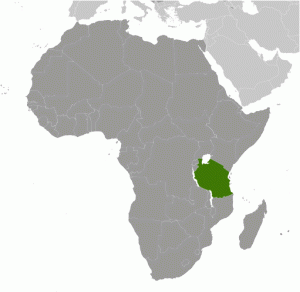
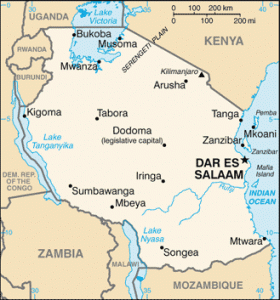 Tanzania is located in Eastern Africa, bordering the Indian Ocean, between Kenya and Mozambique. The country is slightly larger than twice the size of California. Environmental issues are of critical importance, including soil degradation, deforestation, desertification destruction of coral reefs, recent droughts and wildlife threatened by illegal hunting and trade, especially for ivory. The country’s population of more than 51 million is young, with more than 60 percent age 24 and younger. The risk of major disease is very high, with food and waterborne diseases and vectorborne diseases, such as malaria, posing health issues, while the country ranked fourth in the number of HIV/AIDS deaths in 2014.
Tanzania is located in Eastern Africa, bordering the Indian Ocean, between Kenya and Mozambique. The country is slightly larger than twice the size of California. Environmental issues are of critical importance, including soil degradation, deforestation, desertification destruction of coral reefs, recent droughts and wildlife threatened by illegal hunting and trade, especially for ivory. The country’s population of more than 51 million is young, with more than 60 percent age 24 and younger. The risk of major disease is very high, with food and waterborne diseases and vectorborne diseases, such as malaria, posing health issues, while the country ranked fourth in the number of HIV/AIDS deaths in 2014.
A Closer Look
Wildlife conservation in Tanzania is of international importance. The United States and other countries are part of coalitions in support of the Tanzanian government to halt poaching and other activities that are negatively affecting wildlife and the environment. According to the U.S. embassy in Tanzania, everything from high tech equipment to the training of game wardens by U.S. Marines is being employed to help. In late 2015, the U.S. and Germany transferred field equipment to the Selous Game Reserve, a UNESCO World Heritage Site and home to one of Africa’s most important elephant populations, to combat illegal hunting that is decimating native animal populations. Poaching is an increasingly serious threat in the Selous Game Reserve, in particular the poaching of elephants for ivory. Controlling this problem is difficult due to a number of factors including the sheer size of the Selous and lack of clear boundaries, as well as limited manpower and equipment to monitor and manage activities in the reserve.
An aerial wildlife census in 2013 funded by Germany determined elephant numbers had declined from over 39,000 in 2009 to just over 13,000 in 2013. Between 2010 and 2013, 17,797 kilograms of illegally exported Tanzanian ivory (4,692 elephant tusks) were seized at overseas ports. The U.S. Fish and Wildlife Service, which suspended the import of elephant trophies in 2014, calls the impact of poaching on Tanzania’s elephant population “catastrophic.”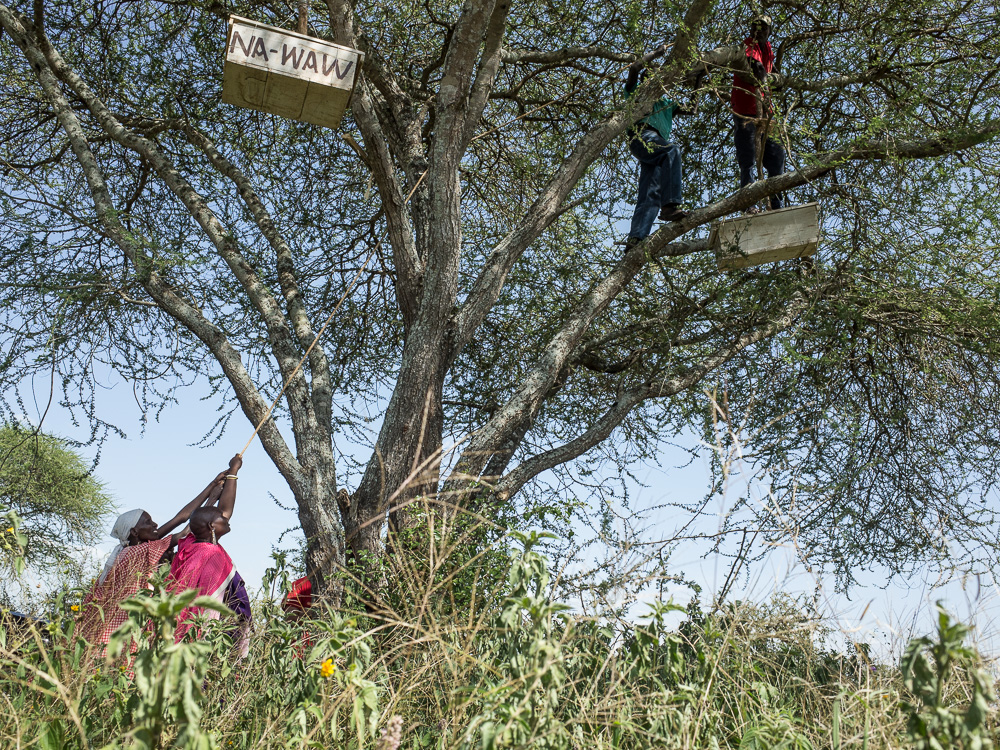
According to the UNDP wildlife crime poses challenges for the environment, livelihoods based on tourism, and sustainable development.
One way that sustainable agriculture is being enhanced and the status quo is being challenged is through increasing use of manmade beehives, like those used by the women entrepreneurs of APW. Pollination by bees is critical to food production, with beekeeping increasing agricultural yields by as much as 300 percent. And it provides hive owners with a source of income that promotes and enhances the environment. The Tanzania Forest Services Agency Tanzania reports that the country has about 48 million hectares of forests (about half of the country) which has a potential of producing 130,000 tons of honey, but only 40,000 tons are being produced currently. The potential and the opportunities are great, but the environmental and conservation impacts may ultimately prove to be even greater.
Source Materials
U.S. Embassy, U.S. Fish and Wildlife Service, CIA World Factbook
